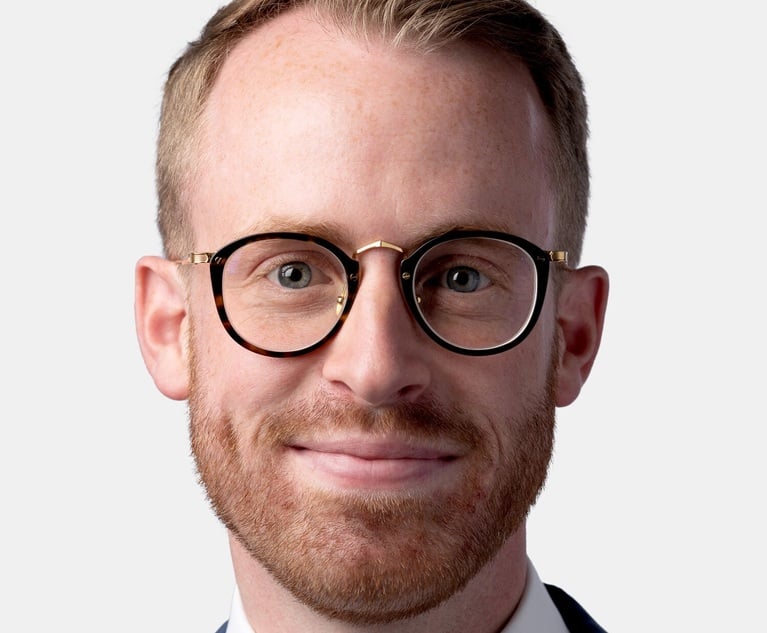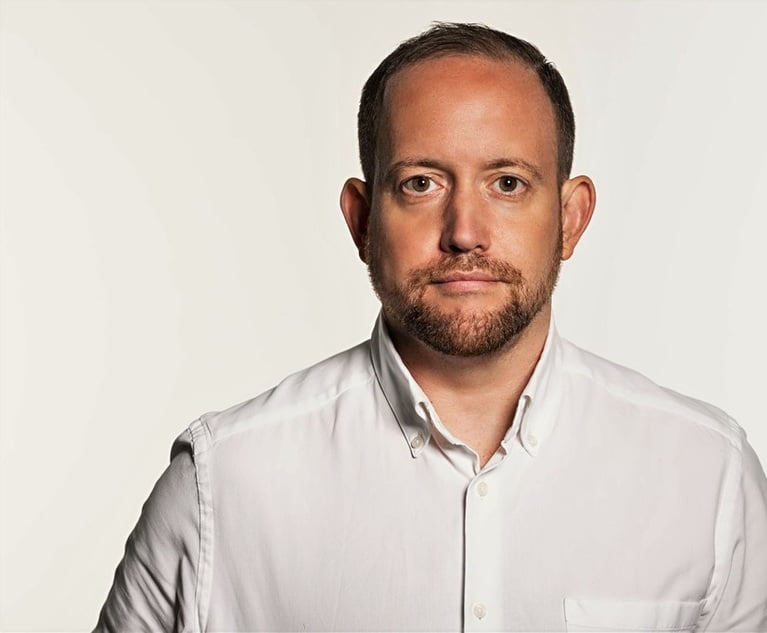The Cadbury hero - Hank Udow on his new role at Reed Elsevier and the epic Cadbury takeover
Ex-Cadbury GC Hank Udow tells Friederike Heine how his legal team coped with Kraft's takeover
November 16, 2011 at 07:03 PM
6 minute read
Ex-Cadbury GC Hank Udow tells Friederike Heine how his legal team coped with Kraft's takeover
Hank Udow has had a tumultuous two years. After seeing Cadbury – a company he had been with for over two decades – through a bitter five-month takeover battle and, subsequently, the painful closure of its longest-standing UK factory, Udow left the company in late 2010 alongside the majority of the company's senior management.
After several months spent with his family in the US, Udow returned to London in early 2011 and took on a new role as global general counsel at FTSE 100 publishing company Reed Elsevier in the spring.
"You have to learn to roll with the punches," he says. "My new role at Reed Elsevier is so exciting and has completely altered my point of view – having spent 23 years in-house at Cadbury, I thought I would probably complete my career there. But things never turn out quite as you expect."
Udow began his career in the litigation team at the New York office of Shearman & Sterling. But he soon realised that largescale cases involving a lot of discovery work were not for him. He took the opportunity to move to Shearman's London arm in 1986, and began to thrive in his new role as a member of the firm's burgeoning City corporate practice.
"I soon realised that M&A was what I loved to do," he remembers. "I am very results-oriented and like it when I am involved in something that feels tangible. This passion for transactional work has remained with me throughout my career."
It was during this stint in London that Udow first came into contact with the soft drinks arm of Cadbury, which had merged with Schweppes in the late 60s. The company's intention at the time was to grow – primarily through acquisitions – in order to achieve its aim of becoming the third-largest soft drinks company after Coca-Cola and Pepsi.
 Impressed by this vision, and attracted by the prospect of doing plenty of deals, Udow accepted a role working in-house for the company in the UK. Soon thereafter he returned to the US and was promoted to Americas general counsel of the soft drinks division, where he oversaw countless brand acquisitions including those of A&W Root Beer, Orangina, Dr Pepper,
7 Up, Snapple and Sunkist.
Impressed by this vision, and attracted by the prospect of doing plenty of deals, Udow accepted a role working in-house for the company in the UK. Soon thereafter he returned to the US and was promoted to Americas general counsel of the soft drinks division, where he oversaw countless brand acquisitions including those of A&W Root Beer, Orangina, Dr Pepper,
7 Up, Snapple and Sunkist.
In 1993, Udow returned to London to become global GC of the soft drinks division and, seven years later when the soft drinks and confectionary businesses were combined, moved into a non-legal role overseeing an M&A team established to fulfil the company's ambition of becoming the world leader in confectionary. In 2005 he was appointed to lead the legal function as chief legal officer and company secretary.
The company went from strength to strength, and it was not long before its management began to anticipate that it would soon receive takeover approaches.
"We simply did not expect it when it came. Given Kraft's level of debt at the time we thought it unlikely it would make an approach for at least another 12 months, until it had deleveraged further and would be able to make an all-cash offer. And we thought that, given our growth, by that time we might be beyond their financial reach."
In 2009 Kraft chief executive Irene Rosenfeld made the first part-share part-cash approach, despite the disapproval of some shareholders. In the end, the deal was secured in the frantic few hours before the final Takeover Panel deadline – the 50% premium on Cadbury's pre-bid share price exceeded the expectations of many in the City – including that of Udow himself.
After the takeover was complete, Kraft's management tried to arrange for some of Cadbury's senior staff members to remain with the company in order to smooth the transition.
"I was one of a few to agree to stay for another three months," he says. "After years of watching the company grow, I felt a responsibility to my legal team as well as to the company itself."
Reflecting on the pursuant changes to the UK Takeover Code, which took effect on 19 September as a long-term result of the Kraft/Cadbury situation, Udow is positive. A company's obligation to clarify its intentions within a tighter timeframe should be welcomed, he argues. "We were under siege for five months, which caused complete paralysis and inhibited the company from entering into new contracts," he remembers.
Udow also reflects on Kraft's pledge to keep Cadbury's Somerdale factory open – a decision it reversed shortly after. "Frankly, it was a devastating blunder," he says. "In my estimation it stemmed partially from Kraft's genuine ignorance of the business and also from the fact that they did not want to stress-test the situation too much in order to gain a public relations angle."
But while some issues relating to the takeover clearly still grate, Udow is obviously enjoying the challenges of his new position at Reed Elsevier. After a three-month transition period with outgoing general counsel Steve Cowden, Udow has been given the task of overseeing the company's compliance function.
But despite more than two decades working in-house, the deal-doer in Udow is hard to put down. Most recently, he helped Reed Elsevier in its acquisition of banking support company Accuity in a deal worth £343m, turning to one of the firm's regular advisers, Morgan Lewis & Bockius, for external support.
"What I love about deal-doing is that all parties – despite having sometimes opposing interests – want to achieve a common goal: to get the deal done, quickly and efficiently," says Udow.
And it is this attitude that undoubtedly influences his feelings on the takeover of the company he had worked for so long: "In retrospect, I can say that the takeover was inevitable. I am a firm believer in open markets – it promotes growth and innovation and is good for our economy. If you live by the sword, you have to be prepared to die by it, too. I just wish it had been Cadbury doing the taking over of someone else."
This content has been archived. It is available through our partners, LexisNexis® and Bloomberg Law.
To view this content, please continue to their sites.
Not a Lexis Subscriber?
Subscribe Now
Not a Bloomberg Law Subscriber?
Subscribe Now
NOT FOR REPRINT
© 2025 ALM Global, LLC, All Rights Reserved. Request academic re-use from www.copyright.com. All other uses, submit a request to [email protected]. For more information visit Asset & Logo Licensing.
You Might Like
View All
Workload and Getting It All Done Top Challenges for In-house Counsel: Survey
4 minute read
Amazon Corporate Counsel in Brussels Returns to US Firm in ‘Boomerang Hire’
2 minute read
Former Miral GC Brings Commercial Insight to BCLP’s Middle East Real Estate Practice
4 minute read
‘A Slave Drivers' Contract’: Evri Legal Director Grilled by MPs
Trending Stories
- 1We the People?
- 2New York-Based Skadden Team Joins White & Case Group in Mexico City for Citigroup Demerger
- 3No Two Wildfires Alike: Lawyers Take Different Legal Strategies in California
- 4Poop-Themed Dog Toy OK as Parody, but Still Tarnished Jack Daniel’s Brand, Court Says
- 5Meet the New President of NY's Association of Trial Court Jurists
Who Got The Work
J. Brugh Lower of Gibbons has entered an appearance for industrial equipment supplier Devco Corporation in a pending trademark infringement lawsuit. The suit, accusing the defendant of selling knock-off Graco products, was filed Dec. 18 in New Jersey District Court by Rivkin Radler on behalf of Graco Inc. and Graco Minnesota. The case, assigned to U.S. District Judge Zahid N. Quraishi, is 3:24-cv-11294, Graco Inc. et al v. Devco Corporation.
Who Got The Work
Rebecca Maller-Stein and Kent A. Yalowitz of Arnold & Porter Kaye Scholer have entered their appearances for Hanaco Venture Capital and its executives, Lior Prosor and David Frankel, in a pending securities lawsuit. The action, filed on Dec. 24 in New York Southern District Court by Zell, Aron & Co. on behalf of Goldeneye Advisors, accuses the defendants of negligently and fraudulently managing the plaintiff's $1 million investment. The case, assigned to U.S. District Judge Vernon S. Broderick, is 1:24-cv-09918, Goldeneye Advisors, LLC v. Hanaco Venture Capital, Ltd. et al.
Who Got The Work
Attorneys from A&O Shearman has stepped in as defense counsel for Toronto-Dominion Bank and other defendants in a pending securities class action. The suit, filed Dec. 11 in New York Southern District Court by Bleichmar Fonti & Auld, accuses the defendants of concealing the bank's 'pervasive' deficiencies in regards to its compliance with the Bank Secrecy Act and the quality of its anti-money laundering controls. The case, assigned to U.S. District Judge Arun Subramanian, is 1:24-cv-09445, Gonzalez v. The Toronto-Dominion Bank et al.
Who Got The Work
Crown Castle International, a Pennsylvania company providing shared communications infrastructure, has turned to Luke D. Wolf of Gordon Rees Scully Mansukhani to fend off a pending breach-of-contract lawsuit. The court action, filed Nov. 25 in Michigan Eastern District Court by Hooper Hathaway PC on behalf of The Town Residences LLC, accuses Crown Castle of failing to transfer approximately $30,000 in utility payments from T-Mobile in breach of a roof-top lease and assignment agreement. The case, assigned to U.S. District Judge Susan K. Declercq, is 2:24-cv-13131, The Town Residences LLC v. T-Mobile US, Inc. et al.
Who Got The Work
Wilfred P. Coronato and Daniel M. Schwartz of McCarter & English have stepped in as defense counsel to Electrolux Home Products Inc. in a pending product liability lawsuit. The court action, filed Nov. 26 in New York Eastern District Court by Poulos Lopiccolo PC and Nagel Rice LLP on behalf of David Stern, alleges that the defendant's refrigerators’ drawers and shelving repeatedly break and fall apart within months after purchase. The case, assigned to U.S. District Judge Joan M. Azrack, is 2:24-cv-08204, Stern v. Electrolux Home Products, Inc.
Featured Firms
Law Offices of Gary Martin Hays & Associates, P.C.
(470) 294-1674
Law Offices of Mark E. Salomone
(857) 444-6468
Smith & Hassler
(713) 739-1250








